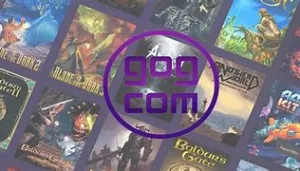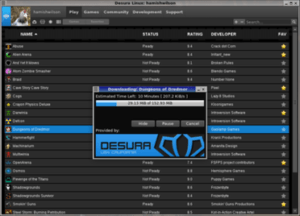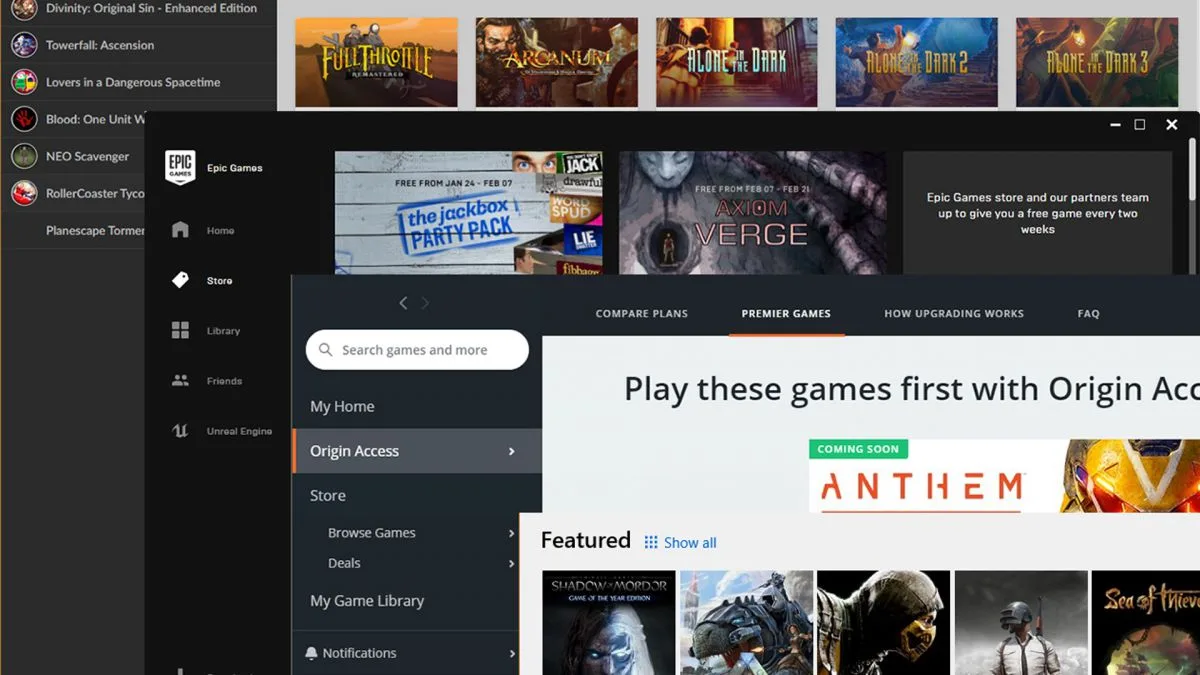Hey there gamers! Are you tired of using the same old gaming platform over and over again? Well, guess what? I’ve got some exciting news for you! In this blog post, we are going to dive deep into the world of gaming and best alternatives to the steam gaming.
Yes, you heard me right – there are other gaming platforms out there that can provide you with just as much enjoyment, if not more! Forget about the monotony of playing the same games on the same platform day in and day out.
It’s time to explore new horizons, discover fresh games, and find the perfect gaming platform for you. So buckle up, because this is going to be an epic journey filled with endless possibilities. Let’s get started, shall we?
Best Alternatives to the Steam Gaming
While Steam has cemented itself as the go-to digital storefront for PC gaming, its dominance in the marketplace doesn’t negate the presence of equally compelling alternatives. Each offers unique features, game libraries, and user experiences that cater to a range of gamer preferences. Here’s a deep dive into some of the most notable competitors that have carved their niche in the gaming distribution landscape:
Itch.Io: A Hub for Indie Game Creators and Enthusiasts

In the vast world of gaming platforms, itch.io stands out with its distinct commitment to independent game developers. Established as an antidote to the restrictive norms of bigger game marketplaces, itch.io has crafted a unique space where indie creators, both seasoned and amateurs, can showcase their art without the hindrance of exorbitant fees or rigid barriers. The platform is not just a marketplace but also a community-driven hub that fosters creativity and innovation.
Key Features:
Launched in March 2013, itch.io quickly became a go-to destination for indie gamers and developers. It currently boasts a remarkable collection of 1359 titles, which balloons to 3327 when including games produced for game jams—testaments to its vibrant and active community. Beyond its sheer volume, itch.io is revered for its staunch stand against Digital Rights Management (DRM), allowing developers to sell their games without imposing restrictive digital licenses on consumers.
This DRM-free nature ensures that buyers have complete ownership of the games they purchase.
Philosophy and Comparisons:
itch.io’s philosophy of an open-market system has drawn frequent comparisons to Bandcamp—a platform renowned for empowering independent musicians. Just as Bandcamp revolutionized the music industry by letting artists sell music directly to fans on their terms, itch.io offers game developers a similar level of autonomy.
The platform’s pay-what-you-want pricing system further underscores its commitment to flexible monetization, allowing creators to offer their games either for a set price or let gamers decide what they’re willing to pay. This system not only empowers developers but also builds a sense of community trust and appreciation between creators and consumers.
GOG.com (Good Old Games): A Deep Dive

GOG.com serves as a bastion for gaming aficionados seeking a trip down memory lane. As digital storefronts evolve and become convoluted with various offerings, GOG.com stands out with its primary focus on offering classic PC games. These are not just plain old games dumped onto a modern storefront; they are meticulously optimized to ensure compatibility with today’s advanced hardware.
The result is a platform where players can relive their favorite gaming moments without the hassles associated with getting older games to run on newer systems. For many, this nostalgic journey is not just about revisiting beloved titles but also experiencing groundbreaking games they might have missed in their original run.
Key Features:
Launched in 2009, GOG.com has curated an impressive collection of titles, boasting 719 games in its library as of the provided data. But beyond its expansive collection, what truly sets GOG.com apart from other digital game retailers is its unwavering commitment to DRM-free gaming.
DRM, or Digital Rights Management, is often viewed as a necessary evil by game publishers, aiming to deter piracy. However, it can often lead to restrictive practices, limiting how and where players can access their purchased games. GOG.com breaks away from this norm.
Every title available on the platform comes without any DRM shackles, ensuring that once you buy a game, you truly own it, free to play it as you wish without any online checks or activation limits.
Why It Matters:
In an era where many digital platforms impose restrictions on game usage, GOG. Com’s approach is both refreshing and revolutionary. By offering DRM-free content, the platform respects consumer rights, emphasizing ownership and flexibility.
For many gamers, especially those who grew up in eras where buying a game meant having full access without additional checks, GOG. Com’s philosophy resonates deeply.
Furthermore, by ensuring that classic titles are compatible with modern systems, GOG.com ensures that the rich history of PC gaming is preserved and accessible to both veteran players and new generations eager to explore the medium’s roots.
Green Man Gaming: A Comprehensive Look

In the crowded space of digital game distribution, Green Man Gaming (GMG) has carved out a niche that both challenges and complements the dominant player, Steam. Understanding the indomitable position of Steam in the market, GMG doesn’t try to replace it.
Instead, it offers a distinctive service: selling Steam keys, often at prices even lower than Steam itself. By doing so, GMG presents itself not as a competitor but as a savvy alternative, rewarding its dedicated customer base with competitive deals.
Key Features:
Established over a decade ago in May 2010, Green Man Gaming has built a vast catalogue, boasting a collection of over 4,500 games. This extensive library stems from partnerships with more than 300 official game publishers, a testament to GMG’s industry reach and credibility.
Their diverse range of games is complemented by a variety of Digital Rights Management (DRM) options. Customers can purchase games with access and activation via popular platforms such as Steam, Uplay, and Origin. In addition, GMG also offers its proprietary Capsule client, adding another layer of flexibility for users.
Unique Selling Proposition:
What truly sets Green Man Gaming apart is its commitment to value. By often undercutting Steam’s own prices, GMG presents an irresistible proposition to gamers: the same game, for a potentially lower price, all while using the Steam platform they know and love.
This approach, along with their diverse DRM options and extensive game library, positions GMG as an invaluable asset for discerning gamers. The platform encourages users to explore, purchase, and play, making it a significant player in the digital game distribution arena.
Desura: An Indie-Centric Gaming Platform

In the ever-evolving landscape of digital game distribution platforms, Desura carved out a niche that spoke to indie game aficionados. Its acquisition in 2013 by Linden Lab, renowned for creating the virtual world, “Second Life,” breathed new life into the platform.
While it stands as a comparable contender to titans like Steam, Desura’s main allure is its distinct emphasis on indie games, setting it apart in a market saturated by mainstream titles.
Key Features:
Desura’s inception in 2010 saw a steady rise in its offerings, boasting a collection of over 1900 games within a short span. The platform stands as a testament to the burgeoning indie game scene, showcasing a vast array of unique games that often fly under the radar in more mainstream platforms.
Beyond its impressive catalog, Desura’s stance on Digital Rights Management (DRM) is noteworthy. In a digital age where DRM controversies are rife, Desura’s flexible approach is praiseworthy. The platform endeavors to offer a range of DRM options, catering to the varied preferences of its user base.
Whether gamers are seeking stringent protection or prefer a more open, unrestricted experience, Desura strives to cater to these demands, marking its commitment to user-centric policies.
In Perspective:
While platforms like Steam command vast user bases and extensive game libraries, Desura’s commitment to indie developers and its adaptive approach to DRM set it apart. Its acquisition by Linden Lab not only provided a financial bolster but also highlighted the potential and value seen in such indie-centric platforms.
As the gaming industry continues to evolve, platforms like Desura ensure that indie games and user choice remain at the forefront of digital game distribution.
Indie Game Stand: A Unique Gaming Marketplace

In the ever-evolving landscape of the gaming world, Indie Game Stand has carved a niche for itself by initially focusing on an innovative approach: the Pay What You Want (PWYW) model. Launched every 96 hours, these deals gave gamers the freedom to decide the price they deemed fit for indie games, challenging the conventional pricing systems and promoting indie developers in the process.
This system not only brought attention to lesser-known game developers but also fostered a community built on trust and the shared love for indie titles. Established in September 2012, Indie Game Stand quickly expanded its horizons. From its initial model, it grew into a full-fledged gaming marketplace, housing a collection of 337 games.
Additionally, their unique deals have featured a further 148 titles, bringing their total offering to a remarkable number. This vast collection showcases the platform’s dedication to promoting indie developers, offering them a space to shine amidst the heavyweights of the gaming industry.
A significant feature that sets Indie Game Stand apart is its stance on Digital Rights Management (DRM). While the gaming world remains divided on DRM’s utility, Indie Game Stand predominantly leans towards providing DRM-free games, emphasizing the freedom of usage for the gamers.
However, understanding the varied needs of both developers and users, they’ve maintained a flexible system. This allows developers to choose different DRM methods if they prefer, catering to a broader audience and ensuring that the platform remains inclusive for all indie developers and their diverse preferences.
Humble: A Unique Blend of Gaming and Charity

Founded in 2010, Humble started its journey as a trailblazer in the world of indie game bundles. By curating collections of games sold at a price determined by the purchaser, they not only popularized the “pay what you want” model but also integrated charitable causes, allowing buyers to allocate a portion of their payments to support various charities.
This innovative approach positioned Humble as a bridge between gaming enthusiasts and philanthropy, establishing a unique position in the digital distribution landscape. Over the years, Humble’s ambitions have expanded beyond bundles.
While they still retain the bundle model that made them famous, they’ve launched their own digital storefront to sell games, known as the Humble Store. This expansion has seen them host a plethora of titles, with a catalog boasting over 300 individual games.
Notably, they’ve remained committed to a consumer-friendly approach by emphasizing DRM-free content, allowing gamers to enjoy their purchases without restrictive digital rights management. This DRM-free ethos aligns with their commitment to granting gamers agency, be it through pricing or the freedom of game ownership.
In the vast sea of digital game distribution platforms, Humble stands out due to its unique fusion of indie gaming, flexible pricing, and charitable causes. The platform offers a win-win scenario where gamers can acquire titles at their desired price point while contributing to charity, reaffirming the belief that the gaming community can be a force for good.
As gaming continues to evolve, Humble remains a testament to the potential of blending entertainment with benevolence.
Do These Alternatives Compare to Steam?
Steam is definitely not the only choice, but these alternatives can definitely be compared. While Steam is the most popular digital distribution platform for games, alternatives like Epic Games Store, GOG.com, and Origin offer their own unique features and benefits.
For example, Epic Games Store often provides exclusive free games and discounts, GOG.com focuses on DRM-free games with a huge library of older titles, and Origin offers a wide range of EA games and early access to demos. Ultimately, it depends on your personal preferences and what you’re looking for in a gaming platform.
There Any Security Advantages to These Alternatives?
Yes, there are security advantages to using these alternatives. By diversifying your security solutions, you can create multiple layers of defense, making it harder for attackers to breach your system. Additionally, alternative security solutions often offer different features and capabilities that can complement each other, providing a more robust security framework.
Furthermore, implementing different vendors or solutions reduces the risk of a single point of failure, ensuring that even if one security solution fails or is compromised, your overall security is not compromised. So, by exploring and adopting alternative security options, you can enhance your overall security posture and better protect yourself and your assets.
Are the Costs Associated with Using These Alternatives?
The costs associated with using alternatives can vary depending on the specific alternative you choose. For example, if you opt for solar power instead of relying solely on grid electricity, you’ll likely have to invest in solar panels and the necessary equipment. Similarly, switching to an electric vehicle might require upfront costs for purchasing the vehicle or installing a charging station at home.
However, it’s important to consider the long-term benefits and potential savings. Using alternatives can often lead to reduced energy bills, lower maintenance costs, and even potential government incentives. So, while there may be initial costs, the long-term advantages make them worthwhile investments for both your wallet and the environment.
FAQ
What is Steam?
Steam is a digital distribution platform developed by Valve Corporation, offering a vast library of games for purchase and download. It provides a centralized hub for gamers to organize their digital collection, connect with friends, and access various gaming features.
Why Look for Alternatives to Steam?
While Steam is a popular platform, it’s always beneficial to explore alternatives that may provide unique features, a different game selection, or better pricing options. By uncovering these alternatives, you can expand your gaming experience beyond Steam’s offerings.
Are These Alternatives Compatible with Different Operating Systems?
Yes, most of these alternatives are compatible with various operating systems, including Windows, macOS, and in some cases, Linux. However, it’s always recommended to check the system requirements and compatibility information provided by each platform.
Can I Transfer My Steam Game Library to These Alternatives?
Unfortunately, you cannot transfer your Steam game library directly to other platforms. Each platform operates independently, and game licenses are usually tied to the specific platform on which they were purchased. However, you may find similar games or purchase them again on these alternative platforms.
Are the Prices of Games Comparable on These Alternative Platforms?
Pricing varies across platforms and depends on factors such as game popularity, age, and platform-exclusive deals. While some games may have similar pricing, certain platforms may offer exclusive discounts or special promotions, resulting in varied pricing options. It’s always a good idea to compare prices before purchasing.
Final Words
It isn’t just a case of asking and answering questions when discovering the ultimate alternatives to Steam gaming. It can completely transform how you play; it holds the potential to completely change your gaming experience. By exploring other gaming platforms and services, you open yourself up to a world of possibilities and new adventures.
Whether you are looking for a different game launcher, a digital game store, or even a complete gaming marketplace, there are numerous options available to cater to your gaming needs. Don’t limit yourself to just one gaming client; branch out and discover the vast array of game distribution platforms and online gaming platforms out there.
Embrace the variety and explore the different features each platform has to offer. Take control of your gaming experience and find the alternative to Steam that resonates with you. By doing so, you can enhance your gaming adventures and immerse yourself in a whole new world of gaming possibilities.
So, why settle for one when you can have it all? Keep an open mind, try different platforms, and reap the benefits of a diversified gaming experience. Ultimately, it is your choice, and it is up to you to uncover the ultimate alternative to Steam and revolutionize your gaming life.

